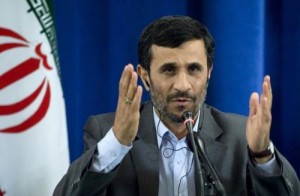 On Dec. 14 Anatolia news agency reported that Iranian President Mahmoud Ahmadinejad was set to pay a one-day visit to Konya to attend the ceremony marking the 739th anniversary of the passing of the great Sufi mystic Mevlana Celaddiin-i Rumi.
On Dec. 14 Anatolia news agency reported that Iranian President Mahmoud Ahmadinejad was set to pay a one-day visit to Konya to attend the ceremony marking the 739th anniversary of the passing of the great Sufi mystic Mevlana Celaddiin-i Rumi.
The report came only a few hours after U.S. Secretary of Defense Leon Panetta paid a snap visit to the ?ncirlik base, one of the most strategic military bases in the Middle East, where he confirmed that Washington would deploy two Patriot batteries to Turkey.
On Dec. 15 Iran’s military chief of staff, Gen. Hassan Firouzabadi issued a stern warning to Turkey and argued that the deployment of Patriot systems was part of a Western plot to create a world war. This very strongly worded criticism was followed by reports of Ahmadinejad’s cancellation of his scheduled trip the afternoon of Dec. 16.
While journalists were trying to find out the real reason behind the cancellation, Iran’s foreign minister Ali Akbar Salehi took the floor and called the Turkish move of deploying Patriots “provocative.” “The deployment of Patriot missiles will achieve nothing but to provoke and, God forbid, result in being forced into an uncalculated action,” he said.
The Turkish response came from Foreign Minister Ahmet Davuto?lu yesterday. His strident statement focused on Iran’s continued support of one of the world’s most brutal regimes, killing and even bombing its own people.
“Instead of criticizing the [Patriot] system, Iran should say stop to the Syrian regime, which has been continuously oppressing its own people and provoking Turkey through border violations,” Davuto?lu said in Ankara. “It is time to send clear messages to the Syrian regime.”
Even at the most strained times, Turkish and Iranian officials were paying utmost attention not to engage in a war of words and to resolve the problem behind closed doors. However, accusations from the Iranian side were so strong that they could not be left unanswered.
For Faruk Lo?o?lu, deputy leader of the Republican People’s Party (CHP), this tension between two neighbors is getting much more dangerous and could potentially hurt regional stability. Calling both sides to a constructive dialogue, the veteran diplomat recalled that reconciliation between the two countries was also vital for the resolution of regional problems as well.
The heightening character of the tension between the two countries was first seen when Turkey decided to deploy NATO’s early warning radar system in 2011. Iran regarded the move as a threat and threatened to hit the NATO facility in the case of an attack from the West.
For Iran, deployment of Patriots is yet another offensive move coming from NATO and an indication that the alliance is increasing its military presence in the region. The course of developments is rapidly bringing the two countries to the point of no return in their ties, unless Ankara and Tehran decide to enter into a constructive dialogue.
By Hurriyet Daily News
The Iran Project is not responsible for the content of quoted articles.

 QR code
QR code